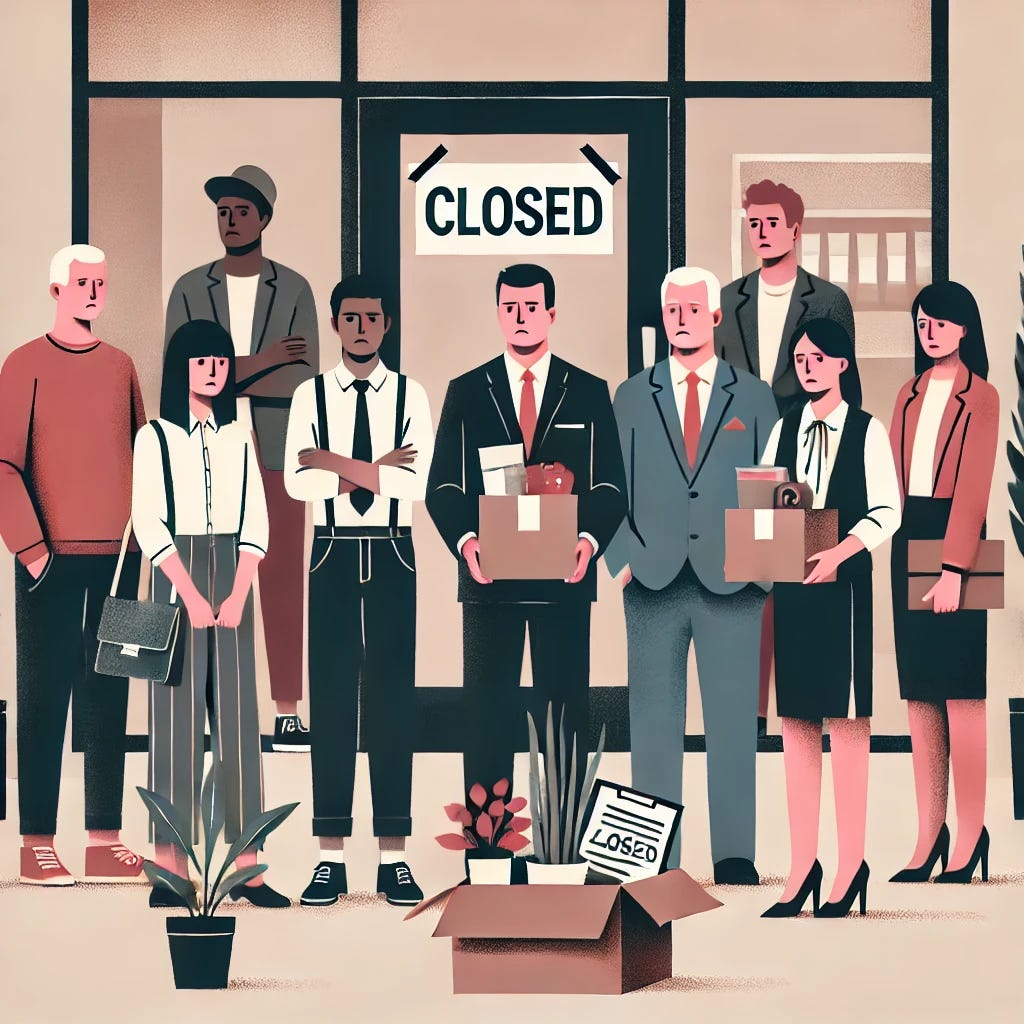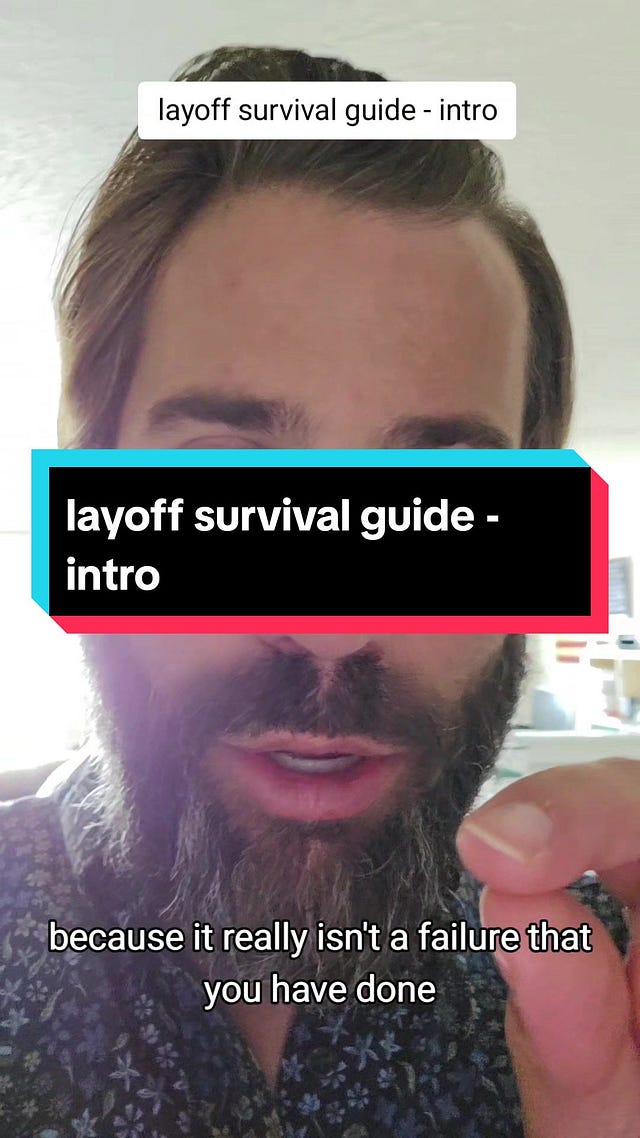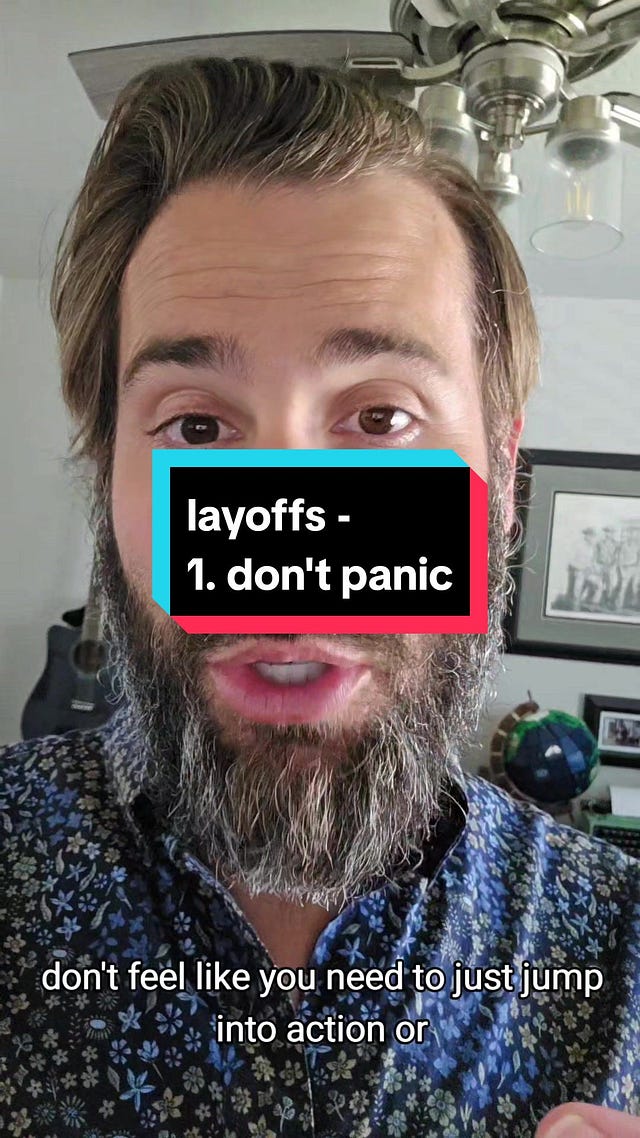Depending on your culture, you may have a variety of rites of passage. Going to school for the first time. Turning a specific age like 13, 15, 18, etc. Getting your driver’s license. Graduating from school. Moving out of your parents’ home and into your own home. Getting your first job.
Unfortunately, getting laid off has become a new rite of passage, especially in the tech industry.
I used to think of getting laid off as the ultimate shame. I was ashamed to even discuss it because I felt like such a failure. Too much of our identity can get tied to our job and our profession, even for those of us who know better.
While I can’t fully shake those feelings, I’ve realized that layoffs are not a failure by the employee. They are a failure of the company and executives. If you’ve been laid off for any reason, your management has failed you. Maybe they have run the company poorly. Maybe they’ve made poor projections about growth and hired too many people. Maybe they’ve put you into a role that wasn’t a good fit and they haven’t developed you appropriately. Or maybe they’re simply reflecting our current capitalist hellscape and are more concerned with profits than people. No matter the reasons, you are not a failure. Something in the system has failed.
I was recently talking to a friend who was laid off. This has happened to so many of us over the past few years, including me. So I wanted to put together some tools I’ve used to navigate getting laid off.
I’m not a career coach or a guru who landed multiple jobs in 20 days. So these are just my ideas. If they help you, great. If you think they are trash, you don’t have to use them. And you can let me know what has worked for you instead so I can update my list.
1. Don’t Panic
I was laid off at the beginning of the tech layoffs when things turned, and it’s just gotten worse over the last few years. I was frustrated and angry and confused and had so many emotions. When I think about it, I still have many of those emotions.
I think it’s okay to have all of those emotions. And it’s okay to just feel and process them. For someone like me, one of the first things may do is jump into action. But taking even a day to just step away from everything can be really healthy.
Be upset, be sad, be happy. Be whatever you want. I’m not here to tell you what to be. Just don’t be at work.
For me, it happened right around the holidays, so it made little sense to jump into action anyway because there wasn’t much to do. So I took a little time to just be with family and friends and then started to create a plan.
But don’t panic immediately. There’s always time to panic later.
Just take a breath.
2. Organize Your Finances
The next thing we did was figure out our finances.
First, apply for unemployment. Here in the US you have to apply for unemployment and it is different in every state. I don’t have any idea what it is like in other countries, though I assume many other industrialized countries have much better systems than the US. I don’t even know what it is like in each state, so you’ll have to check. But definitely apply for it immediately or at least check on it.
You may not qualify immediately. If you get a severance payment like 2 or 3 week’s pay, which seems common, then they may count that and you can’t start getting unemployment until after. That was my case since I got a short severance.
I don’t know if most people still have some sort of stigma with unemployment. But they shouldn’t. There is a reason it exists, and it is for this purpose. When people lose jobs, they need to keep living. So don’t feel bad about getting it. Most people here probably won’t, but if you’re talking to someone who thinks it is a government handout, this is literally one of the purposes of our government and it should be a lot more because it is barely enough to keep you afloat.
For us, we had to dip into our savings for our other expenses. So this advice is going to be too little too late if you have already been laid off, but if you can build up savings, do it. You may need it.
You should also take a hard look at your budget and cut out everything. We cut down on everything. We talked to our kids and let them know we had to stop eating out and doing other stuff for a little while and we just cut so much.
If you’re not using any sort of budgeting tool, I really love Monarch Money. I switched to them after Mint went away, and it has all the tools I need. This will help you understand where money is going and what you can cut back on while tracking all your spending. It’s a good habit, even when you’re employed.
3. Insurance
If you’ve been laid off, you may need insurance. In the US, most people get insurance through their employer. This is not a great way to get health insurance because we constantly change employers. But it is how we do it for the last 70 years or so for a number of reasons and it is the messed up system we have.
If this is your first time in this situation, you’ll now realize why so many Americans want to change the system and want to have national healthcare or something different. Because things are okay if you are always employed (though not great), but as soon as you don’t have a good job with good insurance, things get messed up fast. (Only those who are benefiting from the current system or who haven’t been hurt by it yet would want to keep it, so please listen to those of us who have been hurt by it and let’s try to change it for the future.)
So you have 60 days to opt into Cobra, which is continuing to use your former company’s plan. If you can find a job in 60 days and don’t have any major health issues, this may be a good route. You can just pay out of pocket for anything and then, if a major issue comes up, get on cobra and use it.
For us, we have kids and health issues. So we got onto the healthcare exchange and got a plan to get us through. It was a less expensive plan for emergencies and we ended up paying for most routine things out of pocket because it was just cheaper than trying to use insurance for anything. But the Obamacare exchange or Healthcare.gov exchange is actually pretty good. You’ll have to check it out for your state. The insurance companies aren’t good and we just need a federal option, but that is another topic for another time.
4. Optimize Your Presence
So now you’re ready to apply for jobs.
Not so fast there, turbo.
You need to get things updated. That includes your entire online presence.
You obviously need to update your resume. This is standard stuff. I used ResumeWorded to help me. Most companies use ATS software to review candidates before a human looks at the resume, so you need to get past the filters. This tool helps with that.
Again, I am not an HR professional. I have never used these HR or ATS systems. I did notice a significant difference from before and after, though. I did not have an optimized resume before and did after, and it helped quite a bit.
To optimize, I went through job postings that I was the most interested in and used those as templates and spent a lot of time optimizing my resume based on 5 postings that I thought were the most representative of jobs I was interested in as well as my most recent experience. From that, I created a template resume that was pretty good.
For LinkedIn, ResumeWorded also has a feature for that. I expect that hiring managers and others go to LinkedIn. I always do when I’m interviewing, so you want to polish that really well, so it reflects your latest experience. I wouldn’t treat your resume and LinkedIn the exact same, but you want them to coordinate well.
For what it’s worth, I don’t fully subscribe to the idea that every line of a resume has to have a metric in it. In fact, I don’t like reading those types of resumes or profiles. My eyes kind of glaze over and I feel like they’ve been over optimized. I find myself asking questions like “how did you improve sales by 30% in 60 days?” I feel like I’m just being fed too much bullshit. But when someone tells me they built a new fitness app the help people reach their fitness goals, that means something. Much more than improved app retention by 10% by optimizing the UX. Anyway, do with that what you want. Everyone says metrics, but I feel like we’ve gone too far.
I have websites as well. They are out of date now because I spent a lot of time on them 2 years ago but haven’t been doing a lot with them recently. If you can, create some online content like a site or portfolio that displays your work that you can direct people to.
5. Apply for Jobs
Applying for jobs sucks. But it is part of the process.
As so many people have talked about, this can be a long and dreary road where you are submitting applications that get lost in hundreds or thousands. But you have to apply and then get the attention. I will not try to be a guru in how to apply for jobs and get 100 interviews or something like that. I think we have too many of those and I’m not a guru or professional and I’m just out here doing the work and giving you ideas.
This is about some things I did.
Keep reading with a 7-day free trial
Subscribe to Prodity: Product Thinking to keep reading this post and get 7 days of free access to the full post archives.








